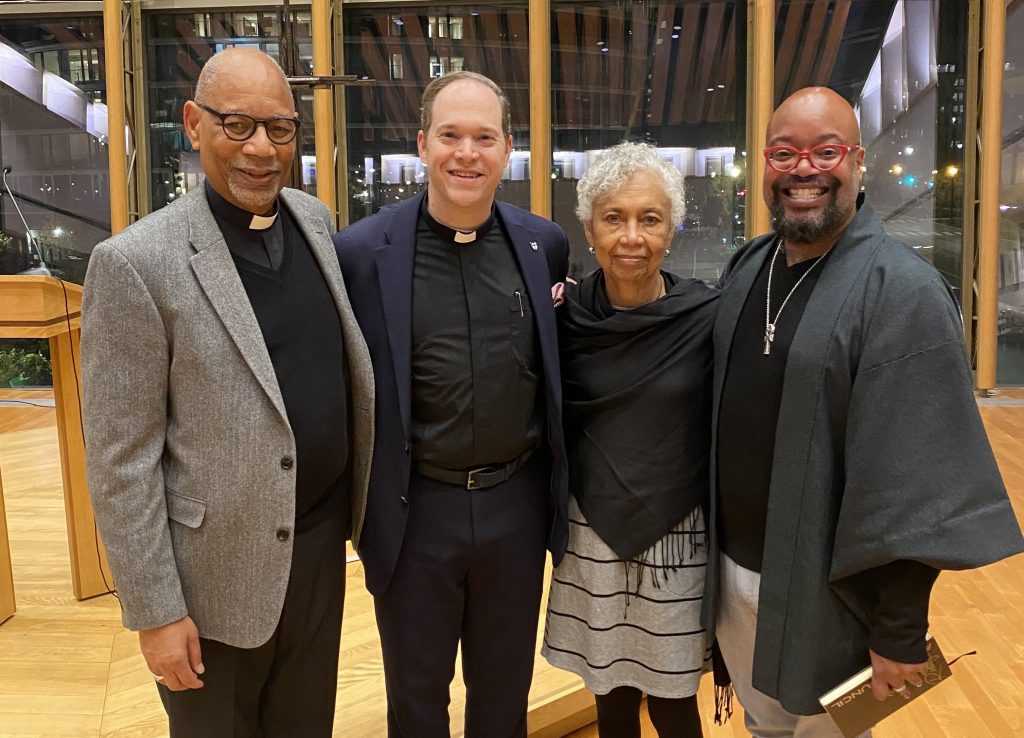And the Word became flesh and lived among us, and we have seen his glory, the glory as of a father’s only son, full of grace and truth.
John 1:14
The mission of the Church is to restore all people to unity with God and each other in Christ.
The Catechism of The Episcopal Church
As Anglicans, the mystery of the Incarnation sits at the center of our theology. From William Temple to Desmond Tutu to Justin Welby, theologians from our tradition have reflected upon the significance of God becoming flesh in the person of Jesus Christ and what that means to us today.
To fully reflect upon the mystery of the Incarnation, one should also explore a few important concepts that proceed from the mystery. The first is the concept of Imago Dei or the “image of God.” We understand that all are created in God’s image and are therefore inherently precious. The Incarnation, where God becomes human, underscores the value of all humanity in the eyes of a living and loving God. This is a fundamental understanding that comes from the Incarnation. Archbishop Tutu put it this way. He said that if we fully understood this, we would genuflect before each other in greeting just like we genuflect before the blessed sacrament on the altar.
The second important concept is that of divine reconciliation and redemption. Jesus became flesh not to condemn the world, but to show us all the way to have abundant life. Abundant life comes from the difficult work of bringing our world closer to the image of the kingdom of Heaven. This involves addressing injustice, inequity, pride, hate, and all of the things that separate us from the love of God. This is especially highlighted in the ministry of Christ Himself and how time and time again He aligned himself with the outcast and the marginalized. As Jesus reminded us all when He read from scripture in the synagogue, He is the fulfillment of this reconciliation and redemption; and we are to follow His example.
So, Jesus becoming flesh and dwelling among us is not just something we celebrate at Christmas. Rather, this mystery informs all of us in the work that we are called to do in our daily lives: to recognize the image of God in each other and to dedicate our efforts to reconcile and redeem the world from past sins and transgressions that have separated us from God.
This is where the biblical concept of social justice surfaces.
I am sometimes asked why social justice is one of the four pillars of Episcopal identity in schools. Shouldn’t we focus on reading and math with a little religion on the side? If we take the Incarnation seriously, our work includes those things and much more. We are called not just to tend to the minds of our students but to their bodies and spirits. And because all are created in the image of God and are precious, we have to explore what to do when we fall short and experience sin in our culture. Social Justice is the attempt to take our failings seriously alongside the mission given to us by Christ of reconciliation and redemption.

There are so many in our schools who live this calling each and every day. Perhaps one of the finest examples is Sandi Hannibal. You may have seen my notice about Sandi’s death last week. As a member of the NAES staff team, Sandi was instrumental in developing programs and resources that connected Episcopal identity with the important work of social justice. She and her husband Preston understood this concept of reconciliation and redemption when they were called to serve as founders of The Bishop John T. Walker School for Boys (BWS) in Washington, DC. BWS is a member of the Episcopal Urban Schools Alliance (EUSA) which exists to serve families that have been historically underserved by independent schools. When Sandi recalled the discussions that led to the start of BWS, she described the neighborhood where the school was to be located. The school was intentionally planted there so families in low-income neighborhoods would have the same access to high-quality education found in high-income neighborhoods. BWS is doing the work of the Incarnation by bringing the world just a bit closer to the Kingdom of Heaven.
John Bryson Chane served previously as the Bishop of Washington and shared this comment with me recently, “Sandi was a blessing to all who knew her. But her impact on the life of the Diocese and the Bishop Walker School will never be forgotten. Her life lives on in the lives of every boy who graduates from the school and whose life has been changed by her love and compassion for them and their families.” BWS and all of our NAES schools are examples of how the mystery of the Incarnation informs our work.
Social justice is a pillar of Episcopal identity simply because it is an outgrowth of the mystery of the Incarnation. It’s necessary if we are to take seriously the fact that we are all created in the image of God. It is a requirement if we are to follow the example of Jesus in reconciling the world to God. May we always be blessed with the perseverance needed to continue in this biblical work.